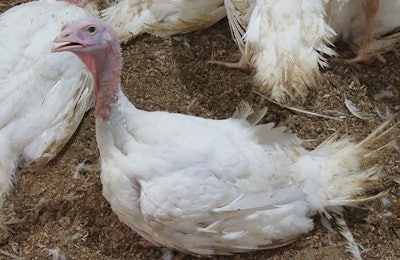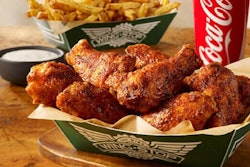
Fifteen years after banding together in the face of losing their livelihoods, the grower-owned cooperative Virginia Poultry Growers Cooperative is going strong.
Virginia Poultry Growers Cooperative Inc. (VPGC) is a grower-owned turkey company based in Hinton, Virginia. It was founded in 2004 by local growers dealing with the closure of their local processing plant. In 2018, it slaughtered 268 million pounds of live turkeys making it the eighth-largest turkey company in the U.S., according to WATT PoultryUSA’s Top Poultry Company rankings.
Saving the farm
In 2003, Pilgrim’s Pride Corp. decided to close its Hinton turkey processing facility and end its contracts with local growers in the Shenandoah Valley of Virginia. The affected growers banded together and formed the cooperative.
About 130 growers pooled their resources and purchased the plant with their monetary contributions in accordance with the square footage of their poultry houses. VPGC was officially chartered in May 2004. In November 2004, the plant re-opened under co-op ownership.
In an interview, VPGC President John King said the greatest challenge in starting the cooperative was putting together a business – raising money, forming a management team and establishing systems and operations – on a deadline. At the time of VPGC’s formation, there were birds in the field in July that the co-op had to be ready to process in November.

John King, Virginia Poultry Growers Cooperative | Photo by Patricia May
The company started with nothing. There was even no furniture, except for a phone on the floor of each office, when it took over. King said the cooperative benefited from its management team and the availability of several customers who were ready to do business with VPGC immediately.
“It worked for us,” King said. “I don’t know whether it could ever be duplicated in the future.”
Today, it has 190 member-growers and employs 435. In addition to the processing plant, VPGC operates a feed mill in Broadway, Virginia, it purchased from Pilgrim’s as well as a grain unloading station and distribution facilities in Harrisonburg, Virginia. Most of the current company leadership started with the cooperative on day one.

The co-op conducted a $15 million expansion of its Broadway Feed Mill in 2019. | Photo by Patricia May
VPGC’s 240,000-square-foot plant specializes in boneless turkey meat and bone-in turkey parts, and processes about 7 million turkeys per year. The single shift plant runs two lines, processing 42 to 45 pound toms. Its customers include processors and distributors of turkey products. It does not sell retail.

The co-op’s plant specializes in boneless turkey meat and bone-in turkey parts, and processes about 7 million 42 to 45 pound tom turkeys annually. | Photo by Patricia May
How the cooperative works
Unlike a vertically integrated poultry company, VPGC is a cooperative. It is owned and democratically controlled by the farmers that use its services. Its growers own 100% of the company and their returns are based upon the amount of business they do with the co-op.
King said in a cooperative, there are more than 190 unique situations for each grower-owner and it’s a challenge to put together a program addressing each farm and family’s needs. A committee of growers, managers and the board of directors – which is made up of six growers and three outside professionals – meet on a regular basis to discuss every facet of the grower contract, which is updated every three years. Moreover, a seven-member grower council representing every segment of the grower community meets every two months. This committee discusses issues of concern to the growers.
Senior managers visit every grower farm at least once a year to listen to questions and concerns and to provide updates on the business. Additionally, growers can attend shareholder meetings hosted by VPGC. King said the animal welfare and education sessions are required and the shareholder meetings typically have close to 100% participation.
“Not every decision is made solely for profit,” King said. “We have to be profitable to stay in business. However, sometimes we make decisions that may not be the absolute best decision for profit and loss, but it is the right decision for all involved and provides stability for our business in the long run.”
Benefits of a different model
He said VPGC works because it is a collective group where each stakeholder plays a role. It isn’t about any one individual or area of the business.
King believes the business model enables some of the best live performance and operational costs in the industry. He said he is convinced co-op growers take more pride in their birds and their farms.
VPGC’s success resulted in a waiting list of growers who want to join the enterprise, as well as existing growers who want to build new houses. The cooperative’s grower-owners have seen the value of their farms increase under the co-op business model, he said. This success is helping to attract younger farmers to the industry, too.
The role of NAE and organic
VPGC is one of the largest suppliers of organic and antibiotic free (ABF) turkey meat. Approximately a third of its sales come from specialty birds raised no-antibiotics-ever (NAE) or are U.S. Department of Agriculture (USDA) certified organic.
The company began processing specialty birds in 2006 and experienced consistent growth in the program since. Last year, the cooperative sold a record amount of both NAE and organic product.
King believes ABF and organic aren’t fads. He thinks consumers want both clean products and transparency. He added that the co-op continues to look at new niches to meet customer needs. It plans to test a new line in Fall 2019 and perhaps an additional line in 2020.

From left: Susan Showalter and her daughter Jennifer Showalter own and operate two no-antibiotics-ever houses at the J2 farm in Rockbridge County, Virginia. | Photo by Patricia May
Capital investment
The co-op is eager to invest in the business to ensure its future. VPGC recently completed more than $80 million in plant and feed mill upgrades, as well as more than $25 million in housing improvements.
Improvements in technology and automation enable the co-op to adapt to the changing labor market. Recruiting and retaining entry level employees is a constant challenge. Automation enhancements allow it to continue processing with fewer employees.
“These upgrades have also allowed us to go beyond ever increasing regulatory and environmental requirements, and further enhance our animal welfare commitments,” King said.
He believes technology makes the plant more efficient and productive giving VPGC a competitive edge.
King said there are no specific plans for expanding volume overall. But rather, the goal is to maintain stability for the growers. Its stakeholders are grateful for the company’s success and its 15 years in business. In response, the cooperative is committed to its long-term sustainability.
“VPGC was formed because of the closure of the plant,” King said. “We do not lose sight of that and know that the foundation needs to support the grower-owners and provide stability for their family farms for years to come.”
Looking toward the future
King said he believes the turkey industry is facing significant challenges that require adjustments in order to sustain healthy growth in the industry. He cited issues with grain handling and pricing, more expensive poults and high competition between proteins in particular.
In this environment, he said, focusing on what is best for the customers and the birds will help ensure continued success in the future.
“These things, added to our practice of strategically looking ahead and proactively addressing our business, has proved successful in the past and contributes to a secure future for our family farmer owners,” King said.
Virginia Poultry Growers Cooperative's Management Team
*Steve Bazzle – Chairman
*John King – President
*Charlie Clark – Director of live operations
*Phil Patterson – Controller
*Charlotte Waller – Director of quality assurance and regulatory affairs
*Ed Clar – Director of sales
*Wes Hoover – Plant manager
Learn more about Virginia Poultry Growers Cooperative: https://bit.ly/2AMAHuI
















